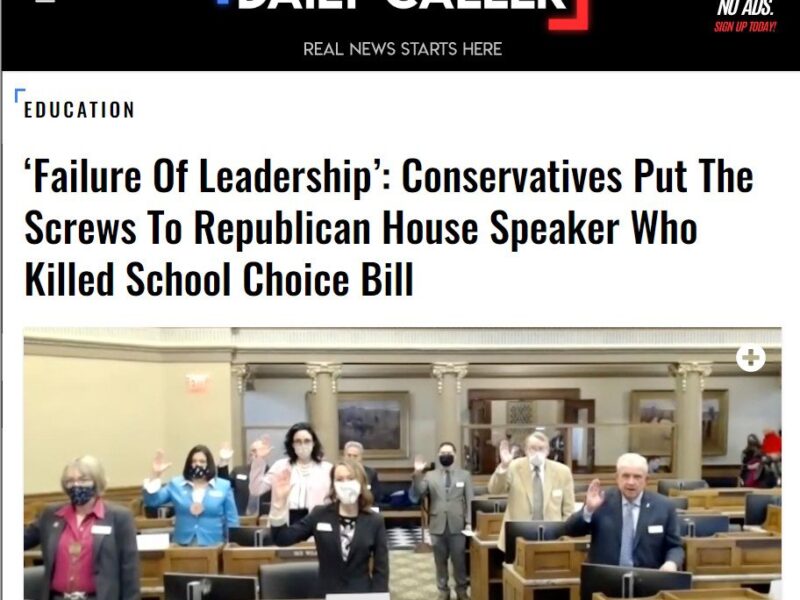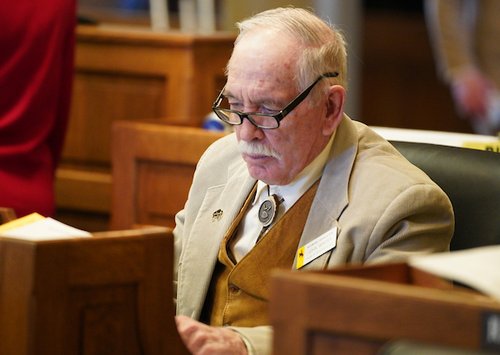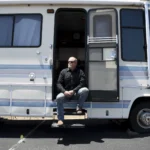In Wyoming and Washington, a Fractured GOP Ponders What Comes Next (Part 3)
House speaker’s moves earn national attention
- Published In: Politics
- Last Updated: Apr 01, 2023

The Daily Caller was among the conservative media outlets to cover House Speaker Albert Sommers’ decision to kill a school choice bill — pairing its story with a screenshot of masked Democratic lawmakers being sworn into office in 2021. (Courtesy photo from The Daily Caller)
By CJ Baker
Special to the Wyoming Truth
This week, the Wyoming Truth is running a four-part series reflecting on the political debates central to this year’s general session, and exploring what’s to come for Wyomingites at home and in Washington. Check out part one and part two.
When Speaker of the House Rep. Albert Sommers (R-Pinedale) refused to allow debate on a school choice bill, a prohibition on “chang[ing] the sex of a child” and a ban on teaching sexual orientation and gender identity to young students, it was not the first time one of Wyoming’s legislative leaders came under fire for holding back controversial legislation. But the national attention the Wyoming Freedom Caucus managed to draw to the issue might have been unprecedented.
“Conservatives Put The Screws To Republican House Speaker Who Killed School Choice Bill,” wrote the Daily Caller. “Wyoming’s GOP House speaker buries parental rights and school choice bills,” reported the Washington Examiner. The Wall Street Journal’s editorial board also made note, writing Sommers had been persuaded by “local district-school officials who fear competition.” Meanwhile, residents in Sommers’ Sublette County district were “bombarded,” as he put it, with robotexts from the State Freedom Caucus Network.

“When you call yourself a Republican and act like a liberal, you gotta pay the liberal tax,” Andy Roth, the group’s president, said in a Feb. 26 tweet targeting Sommers.
Rep. John Bear (R-Gillette), the chair of the Wyoming Freedom Caucus, said earlier this month that the national network “kind of made a big deal” out of Sommers’ decision to kill the three bills, and “I think he’s paying a heavy price for that right now.”
At a legislative forum in Cody on March 10, one audience member called it “very frustrating” to have “very good bills” stuck in the speaker’s drawer.
“So you must have seen the speaker of the House of Representatives on Fox News?” responded Rep. Rachel Rodriguez-Williams (R-Cody), a Freedom Caucus member.
Despite the national pressure, Sommers — and the majority of lawmakers in the House — were unswayed, and the three bills never made it to a committee. The speaker has said tough issues should be examined “without letting rhetoric and intimidation get in the way.”
“I don’t intimidate very easily,” he wrote to a supporter on Facebook last month. “I’m a rancher, I lean into the wind.”

In the weeks since the session ended, Sommers has continued to defend his actions. In a March 23 update to constituents, he described withholding the bills as a part of his responsibility as speaker.
“Bills that are unconstitutional, not well vetted, poorly written, duplicate bills or debates, and bills that negate local control, restrict the rights of people, or risk costly litigation financed by the people of Wyoming are — and have traditionally been — less likely to be introduced,” he wrote.
Sommers and other members of his leadership team have also sought to use the Wyoming Freedom Caucus’s national ties against it, panning the caucus in a March 17 op-ed as “operators of the Code of Washington, D.C. and not the Code of the West.”
They wrote that “outside, Washington, D.C. interests” attempted to “infiltrate the people’s house like never before” during the session and are “putting our conservative, common-sense Wyoming way in jeopardy.”
But in an op-ed of her own, Williams dismissed Sommers’ call for “Wyoming solutions for Wyoming problems” as “a facade to hide behind, conveniently concealing from Wyoming voters a true debate on the issues at hand.”
The session may be over, but tensions live on
There’s no indication the debate will end any time soon. The battle between the more moderate and more conservative factions of Wyoming’s Republican Party played out in the party’s county-level elections earlier this month, with more “traditional Republicans” gaining ground. They now hold GOP leadership positions in Uinta, Lincoln, Fremont, Johnson, Laramie and Natrona counties, according to reporting by Cowboy State Daily, while more conservative Republicans hold sway in Campbell, Sheridan and Park counties. State elections will take place in May.
Meanwhile, the more moderate camp of House Republicans is reportedly forming a “Wyoming Caucus” push back against the Wyoming Freedom Caucus.
Rep. John Winter (R-Thermopolis), a member of the Wyoming Freedom Caucus, doesn’t see the chamber’s current divisions being resolved until 2024.

“It’s gonna take another election to get it to where it’s gonna make any sense, I believe — at least to get it back to where it needs to be,” Winter told the Wyoming Truth.
Conservatives have made in-roads , he noted, figuring their ranks jumped from about eight representatives a few years ago to 26 today.
However, the chamber’s other 31 Republicans remain in the party’s more moderate camp. One of those lawmakers, Rep. David Northrup (R-Powell), predicted his group will “get one or two or three pulled over [from the Freedom Caucus], who start thinking independently.” But he worries what would happen if the “libertarian-minded” group gains control.
Noting the caucus’s opposition to the state’s supplemental budget, “it really is telling to me that if they get a majority, that the state will be in trouble,” Northrup said.
For their part, Freedom Caucus members contend that they represent the true wishes of the state’s Republicans.
“There’s a lot of things that people in Wyoming want to have happen, and it just didn’t get done” in the recent session, Winter said.
In a column penned earlier this month, longtime Wyoming journalist and one-time GOP gubernatorial candidate Bill Sniffin seemed to agree, arguing two-thirds of the state’s residents are “Common Sense Republicans.” These Republicans, Sniffin said, are “folks who are anti-abortion, anti-gender-bending, anti-boys competing against girls, anti-pornographic books in our schools, anti-global warming hysteria, and who are upset about this new emphasis on how bad America is rather than how good it is.”
If the House picks up a half-dozen more conservative members in 2024, Bear said it would give Wyoming the opportunity to be on the “cutting edge” of some of the issues facing the country.
“I think we need to start pushing the boundaries and start standing up for our own liberty, our own freedoms,” Bear said at a town hall event in Gillette. “Now is the time to do it, folks, before we’re really trapped.”
The rift among Republicans makes it unlikely that any particularly controversial legislation will come out of the Legislature next year, as it will require a two-thirds vote to introduce a bill during the 2024 Budget Session. Still, Winter hopes the body can get some things accomplished.
“When we get down there, we need to work together as best we can and … kind of shove a lot of these problems under the rug and do some good things for Wyoming,” Winter said. “It just doesn’t do anybody good to do much fighting.”
“How we get that done is going to be a problem, I guess,” he added. “But if we want to bad[ly] enough, I guess we’ll get some things [done] anyway.”
Check back for part four on Sunday.













